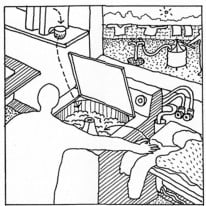B2 - Washing clothes and bedding

Regular washing of clothes and bedding, helps to remove any bacteria, dirt, fleas, mites and other irritants or infection.
Washing of clothes and bedding can help reduce the incidence of infectious diseases, such as diarrhoeal disease, respiratory infections, scabies and other skin infections.
The ability to wash clothes may simply require a water source, place to wash the clothes and the safe disposal of the wastewater generated.
Any laundry design for a house will need to provide the above facilities as well as places to safely store detergents.
Providing washing machines is generally seen as the responsibility of residents, however as a health improvement measure, it may be worth considering supplying commercial type washing machines in houses. Supplying front-loading washing machines will reduce power and water consumption.
The washing of bedding may require larger facilities than can be provided in the house. Community laundries with industrial washing machines will have a high management load and may not be sustainable in smaller or remote communities without being linked to other community services such as a health service or aged care service.
Drying clothes is important and sun drying may help disinfect clothes and bedding. Electric drying will be a low priority and rarely available to poorer families. In tropical areas, clothes drying may require specific planning of the houses and edges of the house.
